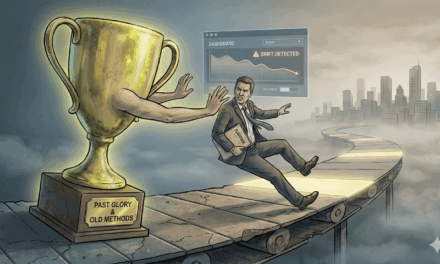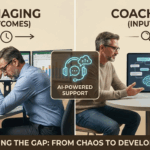
Why Sales Training Fails Without Context

Sales training has become something of a ritual in most organisations. You bring everyone into a room (physical or virtual), walk through a new playbook or methodology, maybe run a few exercises, and then… back to business.
For a few days, there’s a buzz. Reps use the new vocabulary. Managers drop references in team meetings. But by the following quarter, most of it has vanished. The slides gather dust. The acronyms blur. The frameworks you invested in are remembered vaguely (if at all).
And then comes the cycle: another quarter, another training.
So why does this happen?
Because most sales training lacks one critical thing: context.
Learning something once is not the same as knowing how to use it
The problem isn’t always the content itself. A well-structured training on a qualification methodology or discovery framework can absolutely deliver value. But knowing what SPICED or MEDDPICC stands for doesn’t mean you know when or how to apply it in a real conversation.
And that’s the gap.
When reps can’t see the bridge between the theory and their actual day-to-day deals, training becomes academic. It becomes “something we were told to learn,” rather than something that helps them win. It feels detached from their actual job.
In the absence of clear context—relevant examples, deal-specific scenarios, live coaching—it’s no wonder most of that training doesn’t stick.
Context is what makes knowledge usable
Reps don’t need more information. They need relevance. They need to see how a new question type fits into their nextcall. How a different way of surfacing pain will help with this tough prospect. How a pricing conversation could go better tomorrow if they try one small shift in language.
That’s what context gives them: a reason to care, and a reason to act.
This is especially true in fast-moving teams, where reps are often onboarding remotely, managing multiple tools, and balancing shifting priorities. If training isn’t tied to their workflow, it will feel like a distraction.
And when it feels like a distraction, it doesn’t get applied.
The myth of the one-off workshop
Too many enablement teams are still stuck in “event-based” learning. You run a training. People attend. You hope they remember it.
But sales is a moving target. You don’t close deals by recalling frameworks from memory. You close them by adapting in real time. That requires ongoing support, in-the-moment nudges, and real examples that tie back to the frameworks you introduced.
Without that reinforcement, you’re asking reps to drive with a map they saw once, in a room, two months ago.
And frankly, that’s not how people learn.
What works instead
So what does it look like when training is rooted in context?
It starts by aligning enablement with the actual deal cycle. Not just “what’s the best practice” — but where is each rep in their pipeline, and what do they need right now?
It looks like:
-
Roleplays tailored to current prospects
-
Coaching aligned to upcoming meetings
-
Live call reviews that anchor concepts in real situations
-
AI-powered guidance that shows up during prep time or post-call, not buried in a portal
It’s about showing reps what this framework looks like in their world — not just in theory, but in the messy, real-world flow of objections, interruptions, and missed signals.
It’s also about managers reinforcing it daily. Not just “Did you qualify this deal?” but “What signal did you hear that told you this was strategic?” Coaching questions rooted in the same language that was taught.
Where AI is changing the game
One of the most promising shifts in this space is how AI is closing the gap between theory and application. Instead of waiting for the next enablement session, reps can now get real-time coaching—specific to their deal, their call, their performance.
An AI coach can flag where a rep skipped a key discovery step. Or missed a decision-maker signal. Or didn’t ask a risk-related question when one was clearly on the table. It’s feedback, in context, on actual behaviour. And it happens while the learning is still fresh.
This kind of reinforcement turns frameworks into habits.
And habits are what change performance—not training decks.
Final thought
Sales training doesn’t fail because reps aren’t capable. It fails because it’s disconnected from the world they operate in. Information without application fades quickly.
If you want sales training to stick, don’t just focus on what you’re teaching. Focus on when you’re teaching it, how it’s being reinforced, and why it matters in the context of their actual work.
Because sales isn’t a classroom. It’s a moving conversation. And learning should move with it.



































